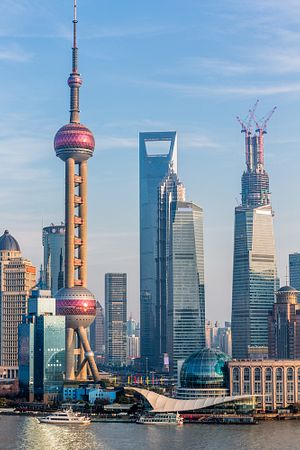Last week, international media had a field day over the news that, based on a new World Bank report, China’s economy will be the world’s largest in terms of purchasing parity power (PPP) by the end of 2014. Yet China itself did not embrace the news. The World Bank noted in its report that China’s National Bureau of Statistics had refuted the methodology used and refused to endorse the report. In addition, China’s state-owned media were largely silent about the data and its implications.
Now, a report from Financial Times suggests China’s unease goes much deeper. FT, citing people who worked on the World Bank report, says that China actively tried to convince them not to use the data. “China wanted to throw this out,” a source told FT. “They begged and threatened for a whole year … China hates it.”
It might seem counterintuitive that China would want to quash a report highlighting its economic prowess. FT’s sources all agreed on the motive behind China’s reluctance: Beijing does not want the increased international pressure that would come from being the number one economy. One adviser to senior policymakers in China preferred instead to refer to per capita GDP statistics (where, according to the new World Bank estimates, China ranks 99th). “On a per-capita basis, China is still a very poor country so it does not want to be asked to do too much on the international stage – at least not yet,” he said.
These concerns were also reflected in a recent commentary published by Xinhua. The title, “China facing long way from world’s No. 1 economy,” directly refutes the proclamations by foreign media that China is now the economic king. The article first dismissed PPP as a secondary measure, and pointed out that China’s nominal GDP is still far behind the United States’. It also emphasized that “China is still far, far behind the industrialized world” in per capita terms. “This country has come a long way, but it remains — undeniably — a developing country with too many fish to fry,” the article concluded.
A similar Chinese-language Xinhua piece cautioned readers not to take the World Bank report too seriously. The article provided a laundry list issues still facing China: unbalanced regional economic growth, environmental pollution, and a lack of natural resources. “China’s basic situation as a large developing country still hasn’t changed,” a researcher from the State Council’s Development Research Center told Xinhua.
The Xinhua articles go to the heart of China’s reluctance to take on the mantle of world’s number one economy. China still considers itself a developing country, with the lessened global responsibilities that accompany that status. The distinction is especially prominent in climate change negotiations, where the idea of “differentiated responsibilities” for developed and developing countries was enshrined in the Kyoto Protocol. However, the idea of developed vs. developing countries color international interactions in far more subtle ways.
Perceptions of whether or not China is acting as a “responsible power,” for instance, largely hinge on whether one defines China as a developed or developing nation. In trade deals, Western countries are often frustrated by China’s refusal to lower entry barriers. With such a large economy, they reason, China should be in a position to open up its markets. China, however, claims that because it is a developing nation, it’s wholly correct for Beijing to protect certain key industries. This very disagreement scuttled a WTO trade agreement on information technology last November. China worries that when it officially becomes the world’s largest economy, it will face even more pressure to define itself as a developed nation.
This reluctance to being seen as number one extends beyond the economic realm. It’s also been suggested that the same motivations were behind the change in the official translation for China’s idea of “new type great power relations.” The term is now translated by official Chinese sources as “new model of major country relations” — thus backing away from labeling China a “great power.”
Over at The Diplomat’s Flashpoints blog, Dingding Chen wrote that “China reclaiming the title of world’s largest economy is truly significant as it signals the beginning of a new international order.” China’s reluctance to embrace the World Bank report hints that Beijing itself is not yet ready to be a leading figure in the “new international order.” This doesn’t mean that China won’t embrace this mantle in the future — China is actively seeking what it calls a “more just” international order, which would give greater voice to Beijing and the other rising powers. But for the moment, China’s government clearly prefers to be able to focus on domestic issues rather than being burdened with more international responsibilities.
China’s netizens largely agree with this view, according to analysis by Tea Leaf Nation. Many of the online commenters rejected reports that claimed China is the world’s best economy. They chose instead to point out all of China’s problems, including the wealth gap and environmental issues, just as the Xinhua commentaries had. Rather than celebrating the World Bank report, netizens bemoaned the issues still facing their country and warned their leaders not to get complacent.
Out of a sense of national pride, China very much wants to be seen as “rising” — as being on the path to greatness. But out of practicality, China’s leaders are not ready to announce that their country has actually achieved top-dog status, economically or otherwise.

































